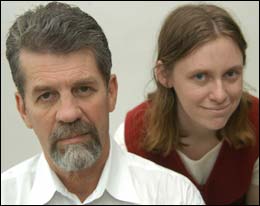At least five L.A. Weekly senior editorial and art department employees -- including veteran education reporter Howard Blume -- have filed grievances with management via the International Association of Machinists, the paper's bargaining unit, reports L.A. Alternative Press. Most are alleging that they're being pushed out of their jobs without adequate union process as specified in their contracts and only because they make some of the paper's top union salaries. These charges come on the heels of the September ouster of several veteran employees at The Village Voice, which, like L.A. Weekly, is owned by Village Voice Media.
Freelance journalist Becky Oberg wanted to expand her reportage for NUVO, an Indianapolis alt-weekly, into a book. Carlo DeVito, publisher of Chamberlain Bros., a Penguin imprint, was looking for new projects. Despite the fact that Oberg was, in her words, "an unknown, unagented, first-time author," DeVito called her and asked if she'd turn her story about an Army private's desertion to Canada via an "underground railroad" into a book. Why was a publisher scouring alt-weeklies for book ideas? Says DeVito: "We're always looking for a good story and a new point of view, and that's what a lot of these papers express."
Twelve former employees of the Cleveland Free Times have filed a lawsuit in Ohio against New Times and Village Voice Media, reports the San Francisco Bay Guardian. The suit is the latest fallout from an October 2002 deal between the two companies that shuttered Free Times and New Times Los Angeles. The deal led to a Justice Department antitrust investigation that culminated in a consent decree in which neither company admitted guilt. The suit alleges that the workers who lost their jobs when the two papers closed were terminated illegally; the lawyer who filed the suit is seeking class-action certification.
A plaintiff who alleges the Observer wrongfully disclosed his HIV-positive status has sued the Dallas alt-weekly; its parent company, New Times; and other parties, Texas Lawyer reports. In "Fallen Angel," an article published last December, the Observer referenced the man by name. The plaintiff doesn't dispute that he's HIV-positive but contends that the paper didn't have the right to disclose his condition without his consent. By doing so, he claims, the paper violated the Texas Health and Safety Code. Miriam Rozen writes: "Most attorneys have assumed the statute applied to parties in the medical and insurance industries -- not media organizations." Three of the defendants are seeking the outright dismissal of the plaintiff's petition.
The filmmaker pulled his three-page essay from the Village Voice at the last minute because he didn't approve of the paper's choice of art for its front cover. According to the New York Post's Page Six gossip column, editor-in-chief Don Forst wanted to run a still from the film "Brown Bunny" in which actress Chloe Sevigny performs oral sex on Gallo, the film's star and director. Gallo, however, wanted the Voice to run his photo self-portrait, claiming its full-page publication was a condition of his involvement. Voice publicity director Jessica Belluci told the Post, "When he got wind that we wanted to use another image for the cover, he got all bent out of shape and pulled the whole thing."
San Francisco Chronicle columnist Jon Carroll waxes nostalgic about his stint as a replacement editor and West Coast editor for the New York City alt-weekly 30 years ago. He fondly remembers those days of lothario limeys, noisy Village cafes and fierce internecine battles. He worked back then with Richard Goldstein, the Voice's recently departed executive editor, whom he describes as "a cutting-edge rock writer, a significant figure in gay rights journalism, a funny, eager, smart, loyal, sometimes even puppyish, fondly remembered former colleague."
Richard Goldstein, an executive editor who joined The Voice in 1966, was laid off last Monday in an ongoing restructuring that has seen the departure of at least a half-dozen editorial staffers, reports The New York Times. (Goldstein says he was fired, not laid off.) Publisher Judy Miszner tells the Times that advertising "could be better," and that the layoffs are an "ongoing thing relative to the changing environment and changes in how our audience is looking for information." Editor-in-chief Donald Forst says the restructuring is "tied into our efforts going from a weekly product to, with the Web, daily journalism electronically, in which we're putting stuff up on a daily basis, sometimes on an hourly basis."
- Go to the previous page
- 1
- …
- 57
- 58
- 59
- 60
- 61
- 62
- 63
- …
- 72
- Go to the next page

